29 Nov2021
By UTEP
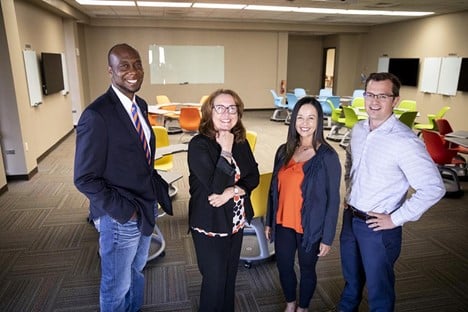
A quartet of educators from UTEP’s Department of Educational Psychology and Special Services earned a $1.1 million grant from the U.S. Department of Education to finance the education of 48 individuals who want to become K-12 counselors or special education teachers, as well as to develop technology-enhanced curricula and methods for greater collaborations. The members of Project BLESSED are, from left, Carleton Brown, Beverley Argus-Calvo, Anjanette Todd and Kristopher Yeager. Brown and Yeager are the co-principal investigators. Photo: Ivan Pierre Aguirre / UTEP Marketing and Communications
The University of Texas at El Paso is strengthening its support for school counseling and special education graduate students thanks to a five-year $1.1 million grant from The U.S. Department of Education. The award enhances the University’s ability to help these students finance their education and gives them access to enhanced technical instruction and supervision support.
24 Nov2021
By Jacqueline E. King, Ph.D.

Now is your last opportunity to make your voice heard in AACTE’s Board of Director election. Voting closes November 30. Be sure to vote by midnight.
This year, there are 12 individuals running for 2 at-large seats and for seats representing AILACTE, HACU, NAFEO, and TECSCU. In addition, members are asked to ratify a set of proposed technical changes to the Articles of Incorporation & Bylaws.
24 Nov2021
By Tammy Moore
AACTE’s Consortium for Research-Based and Equitable Assessments (CREA) project recently released a framing paper titled The History, Current Use, and Impact of Entrance and Licensure Examinations Cut Scores on the Teacher-of-Color Pipeline: A Structural Racism Analysis. The paper addressed the following questions: (1) How are standardized entrance and licensure tests being used as a gateway into the profession? (2) Who determines cut scores for these tests? and (3) What is the historical significance and implications of these tests on the diversity of the profession today?
Lindenwood University represents one of fourteen lead institutions that comprise the CREA project. Tammy Moore, director of certification and field/clinical experiences at Lindenwood, reflects on the effects of entrance assessment requirements at her institution and her institution’s plans to ensure equitable access for all students who choose to pursue teacher education.
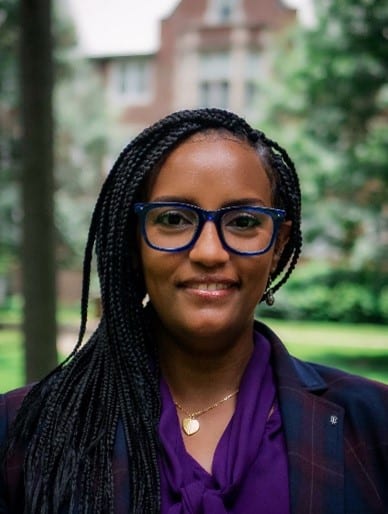 Why did Lindenwood University pursue membership in the CREA project?
Why did Lindenwood University pursue membership in the CREA project?
Lindenwood University – College of Education and Human Services (COEHS) pursued the CREA project to participate in an initiative designed to support our continual efforts to recruit and retain teacher candidates of color. In direct alignment with Lindenwood COEHS commitment to “… an open, diverse, and inclusive learning environment that nurtures the growth and development of all …” the CREA project embodies our commitment to diversifying the teaching profession.
24 Nov2021
By Clay Smith
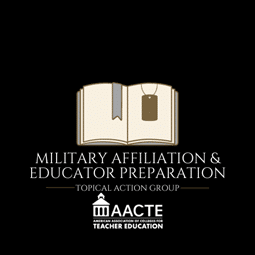 “From the moment I stepped on the yellow footprints, I was teaching somebody something,” said SSgt. (Ret.) Isaiah Ybarra, who served as a Fixed Wing Crew Chief in the United States Marine Corps for nearly a decade. He now teaches social studies at an eastern North Carolina high school. He recalled palpable connections between serving in the military and serving as a teacher-leader, specifically reiterating the opportunity to change and improve the lives of others. Ybarra’s experience is not unique, as hundreds of new enrollments each year confirm education and teacher preparation are amongst the most popular fields for military-connected individuals.
“From the moment I stepped on the yellow footprints, I was teaching somebody something,” said SSgt. (Ret.) Isaiah Ybarra, who served as a Fixed Wing Crew Chief in the United States Marine Corps for nearly a decade. He now teaches social studies at an eastern North Carolina high school. He recalled palpable connections between serving in the military and serving as a teacher-leader, specifically reiterating the opportunity to change and improve the lives of others. Ybarra’s experience is not unique, as hundreds of new enrollments each year confirm education and teacher preparation are amongst the most popular fields for military-connected individuals.
23 Nov2021
By Nicole Dunn
While the role of the principal remains essential, it has evolved over time. Throughout its evolvement, preparation programs, districts, and state policy makers have worked in silos, creating gaps between the skills learned in an educator leadership program and what a principal actually does on the job. In the second episode of AACTE’s new University Principal Preparation Initiative (UPPI) Podcast series chronicling this Wallace Foundation multi-year principal program redesign initiative, listeners will learn what the research says about what the gaps between “learning” and “doing” and how to address them.
In the “Gaps in the Journey to Becoming a Principal” podcast segment, listeners will hear how those findings are seen and implemented through the eyes of one of the UPPI’s Project Directors, Tim Drake.
22 Nov2021
By Jacqueline E. King, Ph.D.

Turkey? Check. Pies? Check. Vote in the AACTE Board Election? Check!
As you tick items off your list ahead of the Thanksgiving holiday, please make sure you include voting in the AACTE Board Election, which closes on November 30. This year, there are 12 individuals running for two at-large seats and for seats representing AILACTE, HACU, NAFEO, and TECSCU. In addition, members are asked to ratify a set of proposed technical changes to the Articles of Incorporation & Bylaws.
22 Nov2021
By Nicole Geary

Photo by Allison Shelley for EDUimages
This article originally appeared in MSUToday and is reprinted with permission.
Students interested in becoming elementary teachers now have an exciting new pathway at Michigan State University.
Faculty in the nationally known MSU College of Education have redesigned the elementary Teacher Preparation Program to not only address changes in how Michigan certifies new teachers, but to ensure that Spartan educators are even better prepared to meet the challenges of today’s schools.
“It is important that we continue to evolve as a teacher preparation program to reflect changing times,” said Tonya Bartell, associate professor and associate director of elementary programs. “This means preparing high-quality beginning teachers ready to serve our nation’s diverse student population, including teaching English learners and students with disabilities, and serving as agents of change toward equity and social justice.”
22 Nov2021
By Meghan Grenda
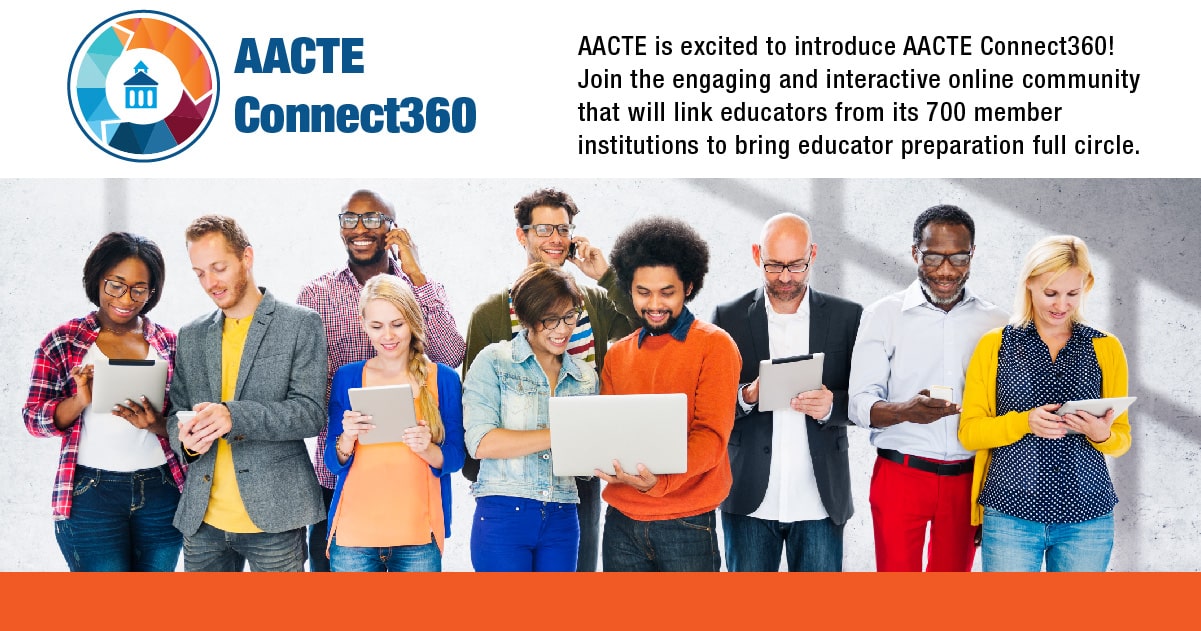 As you probably know, AACTE recently launched its new online community— Connect360. The Connect360 platform is an engaging and interactive virtual platform that brings together AACTE’s community of over 15,000 individuals in an exciting way. Members are able to start discussions and ask questions of fellow AACTE members, comment on each other’s posts, share best practices, and create their own unique member profile.
As you probably know, AACTE recently launched its new online community— Connect360. The Connect360 platform is an engaging and interactive virtual platform that brings together AACTE’s community of over 15,000 individuals in an exciting way. Members are able to start discussions and ask questions of fellow AACTE members, comment on each other’s posts, share best practices, and create their own unique member profile.
With over 20 communities, hundreds of resources, and dozens of discussions, there is a home for everyone. Below are just a few of the news communities:
22 Nov2021
By AACTE
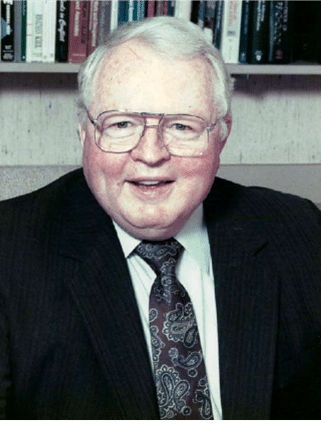 Dean Corrigan, who served as AACTE president from 1981-82, passed away on November 7 at his home in Middlebury, VT. He was 91 years old.
Dean Corrigan, who served as AACTE president from 1981-82, passed away on November 7 at his home in Middlebury, VT. He was 91 years old.
Dr. Corrigan had a great influence on many things that mattered for the educator preparation profession. He was instrumental in the writing of the AACTE manifesto on Educating a Profession, greatly influenced the Association’s stance on special education, served as a liaison for the Association to the National Teacher Corps, helped to shape 10 years of work on inter-professional education, and was a passionate advocate for equity, diversity, and inclusion long before it was fashionable to be so.
22 Nov2021
By Jane E. West and Kaitlyn Brennan
 This blog post is written by AACTE consultant Jane West and is intended to provide updated information. The views expressed in this post do not necessarily reflect the views of AACTE.
This blog post is written by AACTE consultant Jane West and is intended to provide updated information. The views expressed in this post do not necessarily reflect the views of AACTE.
Democrats in Congress are taking a victory lap as they leave town for a weeklong Thanksgiving recess next week. With House passage of the Build Back Better Act, the Biden agenda is one step closer to enactment. But the Senate will have the final say.
House Passes Build Back Better Bill – At Last
After weeks of fraught negotiations, and multiple postponed votes, the House finally passed the Build Back Better Act (the reconciliation bill) this morning. One Democrat (Rep. Jared Golden of Maine) sided with all Republicans opposing the bill. This left the Democrats with the slim margin they needed to cross the finish line.
19 Nov2021
By Leslie Ekpe
 Congratulations to Sergio Maldonado Aguiñiga, Holmes Scholar of the Month for November 2021. Aguiñiga is currently a doctoral student in counseling psychology at Purdue University. Aguiñiga previously attended California State Polytechnic University – Pomona, where he majored in psychology with a minor in political science. While volunteering with the Prison Education Project and Reintegration Academy, he developed interests in integrating character strengths approaches in counseling practices for youth offenders and former and currently incarcerated individuals.
Congratulations to Sergio Maldonado Aguiñiga, Holmes Scholar of the Month for November 2021. Aguiñiga is currently a doctoral student in counseling psychology at Purdue University. Aguiñiga previously attended California State Polytechnic University – Pomona, where he majored in psychology with a minor in political science. While volunteering with the Prison Education Project and Reintegration Academy, he developed interests in integrating character strengths approaches in counseling practices for youth offenders and former and currently incarcerated individuals.
Aguiñiga’s interests in the field of psychology lie in positive psychology and applying the theoretical background in the practice of counseling psychology for youth offenders, former gang members, and formerly incarcerated adults transitioning into the community.
18 Nov2021
Urge Your Representative and Senators to Cosponsor the IDEA Full Funding Act Today
By Michael Rose
 Senator Chris Van Hollen (D-MD) and Representative Jared Huffman (D-CA) this week introduced the IDEA Full Funding Act, bipartisan, bicameral legislation to finally ensure Congress’ commitment to fully fund the Individuals with Disabilities Education Act (IDEA). AACTE is a strong supporter of this legislation and has called for Congress to fully fund IDEA to help support students with disabilities.
Senator Chris Van Hollen (D-MD) and Representative Jared Huffman (D-CA) this week introduced the IDEA Full Funding Act, bipartisan, bicameral legislation to finally ensure Congress’ commitment to fully fund the Individuals with Disabilities Education Act (IDEA). AACTE is a strong supporter of this legislation and has called for Congress to fully fund IDEA to help support students with disabilities.
18 Nov2021
By Ellen Sherratt and Jacqueline Rodriguez

The Teacher Salary Project surveyed 1100+ teachers nationally, with an oversample of recognized teachers (e.g., State Teachers of the Year -STOYs, Nationally Board Certified Teachers – NBCTs, Teach Plus Fellows, and others) and found:
- Nearly half of the surveyed teachers say their salary was not sufficient to sustain them in teaching for the medium-to-long term (two-thirds when teachers who weren’t sure if they could continue teaching on their salary are included).
17 Nov2021
By Linda Minor
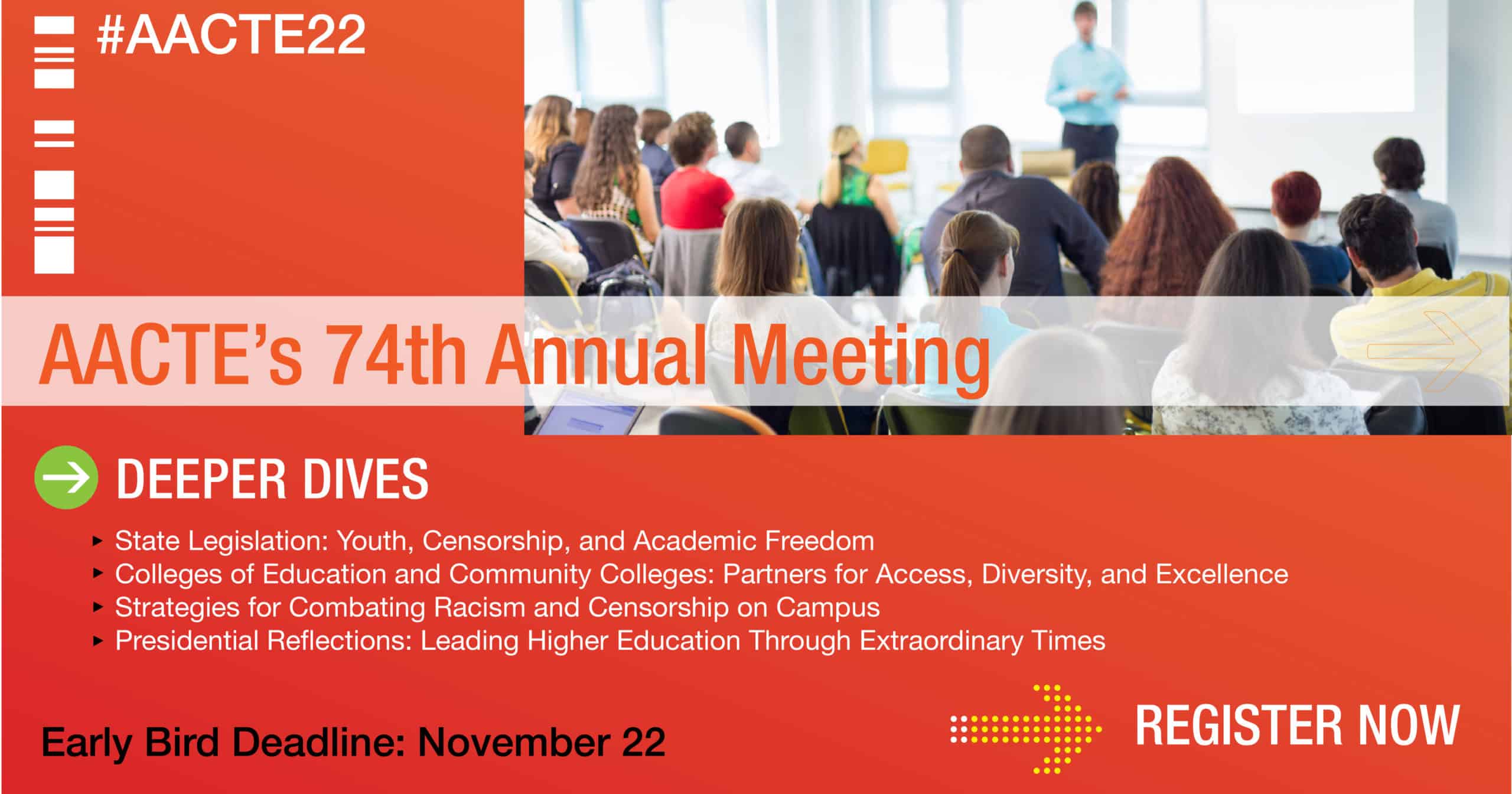
AACTE’s 74th Annual Meeting, March 4 – 6, 2022, will be the first in person AACTE event in over two years. We can’t wait to welcome you to New Orleans as we rethink, reshape, reimagine, and revolutionize the profession post pandemic.
As the 2022 Annual Meeting schedule evolves, AACTE is excited to share an incredible lineup of speakers, topics, and nearly 200 interactive learning opportunities designed to sharpen your skills and equip you to drive change in both teacher preparation and the field of education.
One of the highlights of AACTE’s Annual Meeting are the “Deeper Dives.” These sessions provide a large-scale, expert-facilitated exploration of key issues facing the profession. Here’s a sneak peek at #AACTE22’s “Deeper Dive” sessions.
16 Nov2021
By Katrina Norfleet
 In a recent Washington Post article, AACTE Dean in Residence Leslie Fenwick and two corporate CEOs explore the research that confirms early childhood education programs advance cognitive development and academic achievement that reduces the long-term attainment gaps and produces functioning, responsible adults. Moreover, the authors underscore the critical need to counter the current historic setbacks to high-quality child care—for working mothers and their families and for the U.S. economy at large.
In a recent Washington Post article, AACTE Dean in Residence Leslie Fenwick and two corporate CEOs explore the research that confirms early childhood education programs advance cognitive development and academic achievement that reduces the long-term attainment gaps and produces functioning, responsible adults. Moreover, the authors underscore the critical need to counter the current historic setbacks to high-quality child care—for working mothers and their families and for the U.S. economy at large.
Fenwick, along with Roger W. Crandall, chairman, president and CEO of MassMutual, and JD Chesloff, president and chief executive officer of the Massachusetts Business Roundtable, share a perspective that the business community has a critical role to play to make universal child care and Pre-K a reality.
The article focuses on three primary areas: an evolving American workforce and caregiver model, promoting economic growth and equity in education, and advocating for a solution.
To read the full article, “The business case for public investment in early-childhood programs,” visit the Washington Post website.




 Why did Lindenwood University pursue membership in the CREA project?
Why did Lindenwood University pursue membership in the CREA project?  “From the moment I stepped on the yellow footprints, I was teaching somebody something,” said SSgt. (Ret.) Isaiah Ybarra, who served as a Fixed Wing Crew Chief in the United States Marine Corps for nearly a decade. He now teaches social studies at an eastern North Carolina high school. He recalled palpable connections between serving in the military and serving as a teacher-leader, specifically reiterating the opportunity to change and improve the lives of others. Ybarra’s experience is not unique, as hundreds of new enrollments each year confirm education and teacher preparation are amongst the most popular fields for military-connected individuals.
“From the moment I stepped on the yellow footprints, I was teaching somebody something,” said SSgt. (Ret.) Isaiah Ybarra, who served as a Fixed Wing Crew Chief in the United States Marine Corps for nearly a decade. He now teaches social studies at an eastern North Carolina high school. He recalled palpable connections between serving in the military and serving as a teacher-leader, specifically reiterating the opportunity to change and improve the lives of others. Ybarra’s experience is not unique, as hundreds of new enrollments each year confirm education and teacher preparation are amongst the most popular fields for military-connected individuals. 
 As you probably know, AACTE recently launched its new online community—
As you probably know, AACTE recently launched its new online community—  Dean Corrigan, who served as AACTE president from 1981-82, passed away on November 7 at his home in Middlebury, VT. He was 91 years old.
Dean Corrigan, who served as AACTE president from 1981-82, passed away on November 7 at his home in Middlebury, VT. He was 91 years old.  This blog post is written by AACTE consultant Jane West and is intended to provide updated information. The views expressed in this post do not necessarily reflect the views of AACTE.
This blog post is written by AACTE consultant Jane West and is intended to provide updated information. The views expressed in this post do not necessarily reflect the views of AACTE.  Congratulations to Sergio Maldonado Aguiñiga, Holmes Scholar of the Month for November 2021. Aguiñiga is currently a doctoral student in counseling psychology at Purdue University. Aguiñiga previously attended California State Polytechnic University – Pomona, where he majored in psychology with a minor in political science. While volunteering with the Prison Education Project and Reintegration Academy, he developed interests in integrating character strengths approaches in counseling practices for youth offenders and former and currently incarcerated individuals.
Congratulations to Sergio Maldonado Aguiñiga, Holmes Scholar of the Month for November 2021. Aguiñiga is currently a doctoral student in counseling psychology at Purdue University. Aguiñiga previously attended California State Polytechnic University – Pomona, where he majored in psychology with a minor in political science. While volunteering with the Prison Education Project and Reintegration Academy, he developed interests in integrating character strengths approaches in counseling practices for youth offenders and former and currently incarcerated individuals. Senator Chris Van Hollen (D-MD) and Representative Jared Huffman (D-CA) this week introduced the IDEA Full Funding Act, bipartisan, bicameral legislation to finally ensure Congress’ commitment to fully fund the Individuals with Disabilities Education Act (IDEA). AACTE is a strong supporter of this legislation and has
Senator Chris Van Hollen (D-MD) and Representative Jared Huffman (D-CA) this week introduced the IDEA Full Funding Act, bipartisan, bicameral legislation to finally ensure Congress’ commitment to fully fund the Individuals with Disabilities Education Act (IDEA). AACTE is a strong supporter of this legislation and has 

 In a recent Washington Post article, AACTE Dean in Residence Leslie Fenwick and two corporate CEOs explore the research that confirms early childhood education programs advance cognitive development and academic achievement that reduces the long-term attainment gaps and produces functioning, responsible adults. Moreover, the authors underscore the critical need to counter the current historic setbacks to high-quality child care—for working mothers and their families and for the U.S. economy at large.
In a recent Washington Post article, AACTE Dean in Residence Leslie Fenwick and two corporate CEOs explore the research that confirms early childhood education programs advance cognitive development and academic achievement that reduces the long-term attainment gaps and produces functioning, responsible adults. Moreover, the authors underscore the critical need to counter the current historic setbacks to high-quality child care—for working mothers and their families and for the U.S. economy at large.